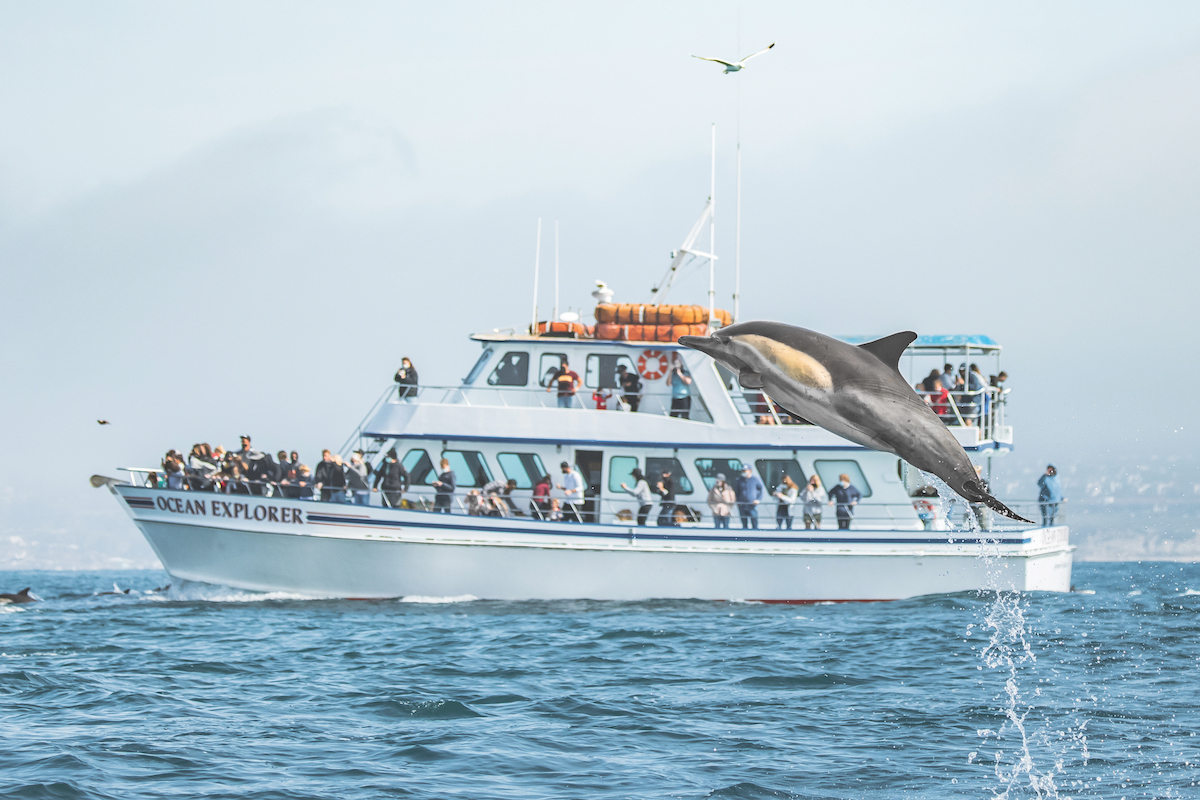
An abundance of animals—both resident and migratory—makes summer the ideal time to get out on the water and experience this beloved coastal pastime.
By Ashley Ryan
Few sights compare to scanning the horizon before your eyes settle on an 80-foot whale in the distance, gracefully making its way through the vast ocean, or the thrill of watching a pod of 100 dolphins jumping through rolling waves. These are just a couple of the life-changing experiences you can have aboard a whale watching boat in Newport Beach.
Newport Whales—a company dedicated to providing high-quality whale watching trips departing from the local harbor—includes both Newport Landing Whale Watching and its sister group, Davey’s Locker. Newport Coastal Adventure, another organization based in town, offers small-boat excursions that give onlookers the chance to get even closer to these impressive creatures.
And while these boats are in operation all throughout the year, the wealth of marine animals that make an appearance during the summer months make it the ideal time to take to the waves and explore nature in our own backyard.
“Summertime whale watching … [allows us to see] some of my favorites,” says Jessica Rodriguez, education and communications manager for Newport Whales. “We have the possibility to see giant blue whales … [and] we also have opportunities to see humpback whales. … Year-round, we see fin whales, minke whales and dolphins. So there’s lots of different variety in the summer.”
Take a deep dive into the many reasons to hop aboard a whale watching boat this season as well as the tremendous diversity of wildlife you could see if you do so.
Get Out on the Water
While the animals are definitely the main appeal, they’re not the only thing that makes these adventures the ideal outdoor experience. “Wildlife aside, think of how fun it is to just go on a boat with your friends and family, grab a drink at the bar, listen to some music and then, on top of already having a great time, you get to see a pod of dolphins or a … whale?” says Dani Fasser, a licensed boat captain for Newport Whales.
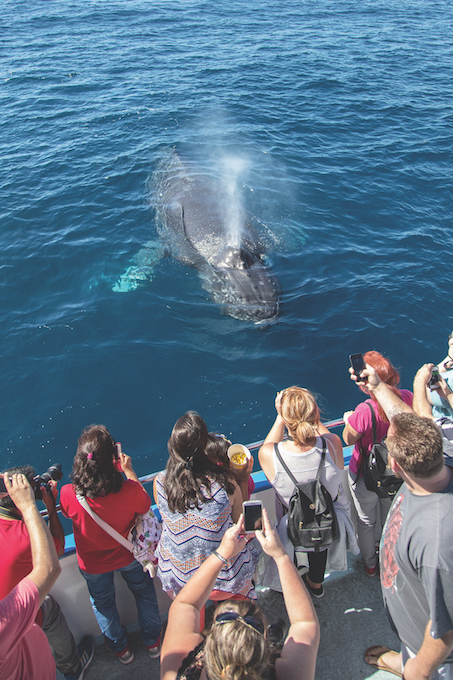
Those of all ages are welcome on the Newport Whales ships, which range from two-story catamarans—like the Newport Legacy, which can hold 140 guests, and the Ocean Explorer, which is ideal for around 80 attendees—to smaller vessels like the Catallac, a more luxury offering. All boats offer cocktails to enjoy as you relax on the sea, with the larger ships containing full bars as well as snacks. Opt for a VIP upgrade on both the standard and luxury tours for reserved seating, a complimentary drink and binoculars to use throughout the trip.
For a more intimate experience, enlist the help of Newport Coastal Adventure, which also partners with Newport Whales and operates out of its docks. The Zodiac-style boats put passengers right at the surface of the water, with an inflatable “collar” around the edge for added comfort. “It’s a really great platform for enjoying the wildlife that we have off of Newport,” says founder Ryan Lawler. “… It’s fewer people that you’re with and a more intimate experience with the animals, … where your seat is right alongside the action.”
Having grown to a fleet of five boats since Newport Coastal Adventure launched a decade ago, there is space for between six and 15 guests on the inflatables. With both public and private charters available, you’re able to easily customize your trip out on the water, and the company also offers extended excursions that expand the usual two-hour whale watches into four- or eight-hour adventures—the latter of which makes a stopover at Catalina Island for lunch.
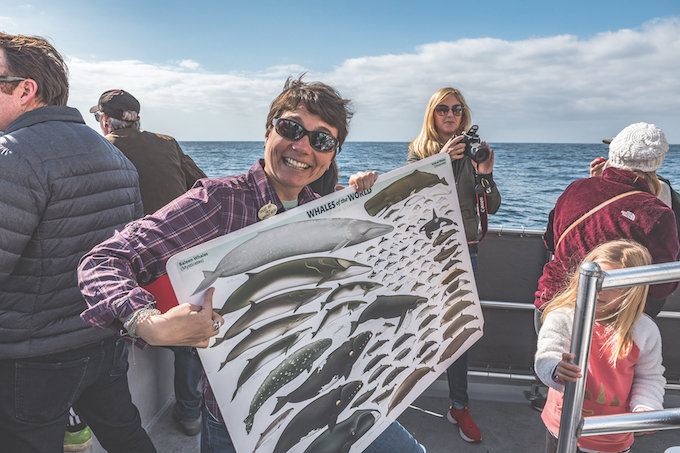
While these experiences are a wonderful chance for locals and tourists to get on the water and see marine life in their natural habitat, it’s also very special to the captains that lead the tours. Having grown up in Newport Beach, Lawler dreamed up the idea for Newport Coastal Adventure while seeing the whale watching boats go out every day during his job driving the Balboa Island Ferry. “I said, ‘There’s got to be a better way to do this that’s a lot more fun,’ ” he recalls. “If you’re on a small, fast boat, you can get to the whales quicker. You’re so close to the water, you can put your hand in the water, basically, and just have dolphins playing with you and your boat, inches from your face. It’s way more engaging.”
Similarly, Fasser, who studied marine biology at the University of Massachusetts Dartmouth, was seeking a way to engage directly with the animals. “I … moved away from research for a closer connection with the wildlife I loved,” she explains. “… Our trips give us a chance to not only share marine life with the public, but also help others develop a passion for protecting it with us.”
Wondrous Whales
Obviously the point of whale watching is to spot a whale, and summer happens to be the best season to do so in Southern California. And the bigger, the better, right? The summer months happen to be the ideal time to spot a blue whale, the largest animal to ever exist on Earth. And, although we are lucky to have them around, Rodriguez says it’s still a rare treat to spot one, as only 1% of the population ever sees them.
“The excitement of seeing a blue whale certainly starts from their size alone, although they are also known to show their tail and surface feed when we’re really lucky,” Fasser adds. “We focus heavily on this species throughout the summer.”
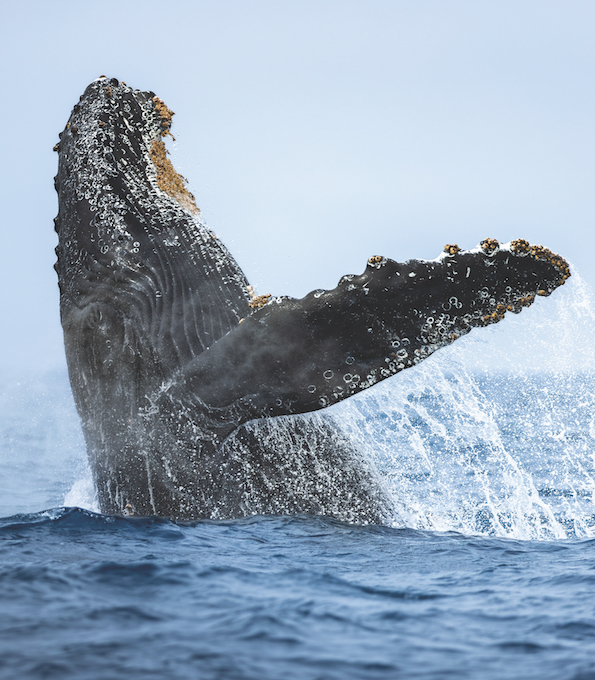
Lawler agrees that spotting a blue whale typically leads to special moments. “They’re just extremely majestic,” he notes. “… It’s a very watchable animal. They’re not afraid of anything, really, because they’re the biggest animals on the planet. And then, when they dive, about half the time, their huge tail comes up in the air—it’s about 20 feet wide.”
But these monumental blue whales aren’t the only cetaceans you’re likely to encounter in the summertime. Playful humpback whales start to appear in the spring with even more sightings in the summer, and they tend to put on a show for local whale watchers.
“When we do see humpbacks—or any species—breaching, … a lot of the time people will ask, ‘Why did they do that?’ and there’s really no rhyme or reason as to why,” Fasser says. “There’s a lot of hypotheses and those include aggression toward other animals and possibly even toward boats as well as play and … sometimes they get foreign material on their bodies and they’re just trying to wash it off. Or social behavior,” she adds, recalling a time that two juvenile humpbacks on either side of the ship mimicked each other with tail slaps, pectoral slaps and, finally, breaching.
Other cetaceans that frequent Newport Beach year-round are large, sleek fin whales, with triangular flukes and distinct coloration, and small, solitary minke whales, which are quick swimmers with inquisitive personalities. “These are species that stop to feed whenever food is readily or plentifully available,” Fasser explains.
Of course, in the last year, local captains have witnessed a surprising number of orca encounters as well, with the killer whales making an appearance as recently as April. According to Fasser, this species is extremely intelligent and inquisitive. “They show it every time we’re with them, whether or not they’re in a friendly mood with the boat,” she says. “… Whether they’re hunting or just socializing—interacting with their young—you see this really amazing, dynamic social structure. … I’ve had some of the most connected encounters with killer whales.”
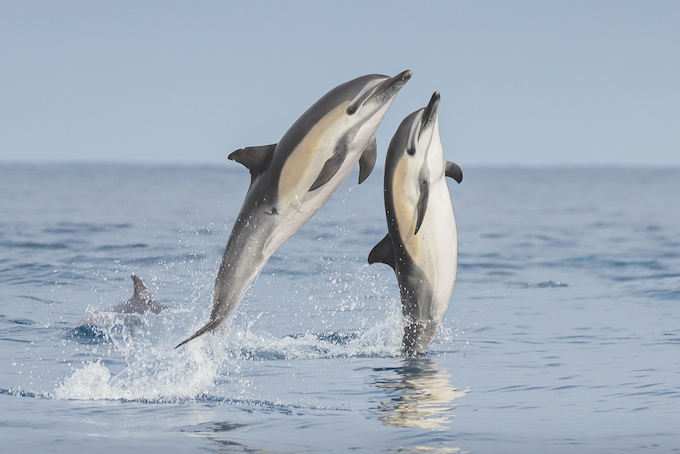
“With the orcas that we saw from December to January, we had about 16 individual sightings, which is historic,” Rodriguez notes. “… Usually it’s only a handful of sightings every couple years. When they are here often, like we experienced this year, we are very lucky.
“… But that’s the nice thing about some of our faster boats: … They’re actively scouting for whales like this and making bigger ranges,” she adds. “We see rare things like this a handful of times each year, including sperm whales, false killer whales [and] pilot whales.”
Wildlife in Abundance
However, whales aren’t the only creatures that can be spotted on these expeditions. In fact, watching dolphins can be just as thrilling—and there are three species that call this region home, including the common dolphin, the bottlenose dolphin and the Risso’s dolphin.
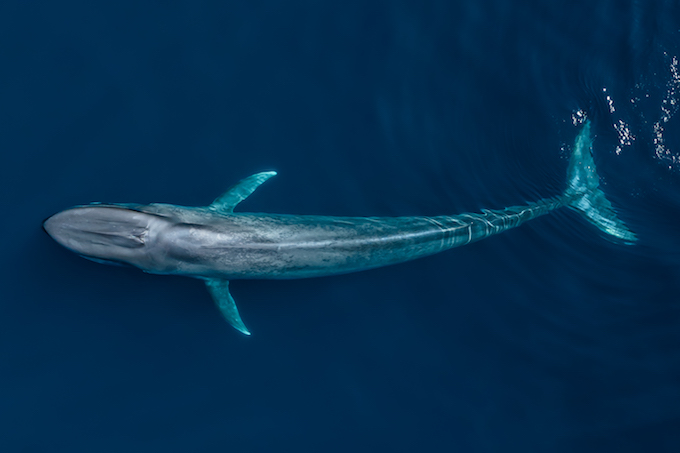
“Dolphins are so wonderful because they will seek you out in a friendly manner. They enjoy coming over to the boat,” Lawler says. “… It’s really special.”
Whale watching can also be ideal for birding, with swarms of brown pelicans soaring through the skies, catching fish and floating atop the waves this year. Other wildlife that Fasser says they often spot in the summertime includes ocean sunfish, sharks, seals, jellyfish, sea turtles and other types of birds—plus the vocal sea lions that you can always count on to be resting on the iconic red buoy just outside the harbor.
The high level of diversity in marine species in the area is likely due to a gigantic underwater canyon that starts at the mouth of this harbor. “The moment that you get outside of Newport Harbor, the canyon wall drops down from 40 feet to 2,000 feet,” Rodriguez explains. “So you get this really interesting topography on the ocean floor, which promotes a lot of nutrients rising from those cool, rich areas of the deep sea … up to the surface, which supports plankton growth … that brings our big whales.”
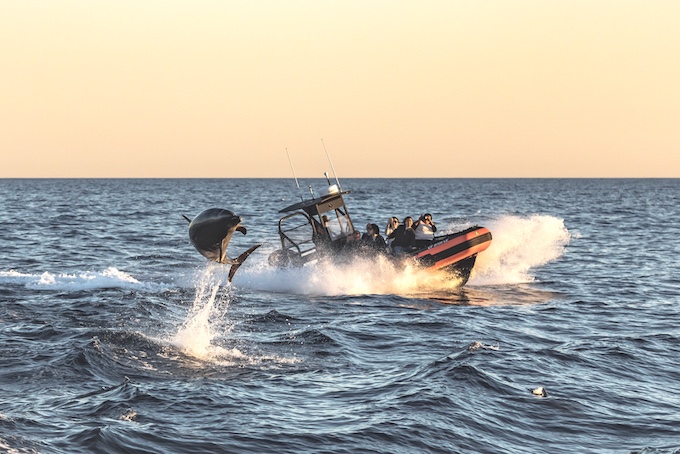
Newport also lies next to Laguna Beach’s Marine Protected Areas and no-take zones, which have encouraged local wildlife to thrive in recent years with strict rules against motored recreation, fishing and even touching the animals.
And with ever-expanding experiences, including Newport Coastal Adventure’s all-day photography workshops and Newport Whales’ bioluminescence cruises—which whisk passengers away at a few hour’s notice when local waves are expected to be glowing blue due to nearby algal blooms—there is always something to see on the water in Newport, so get out and explore.




